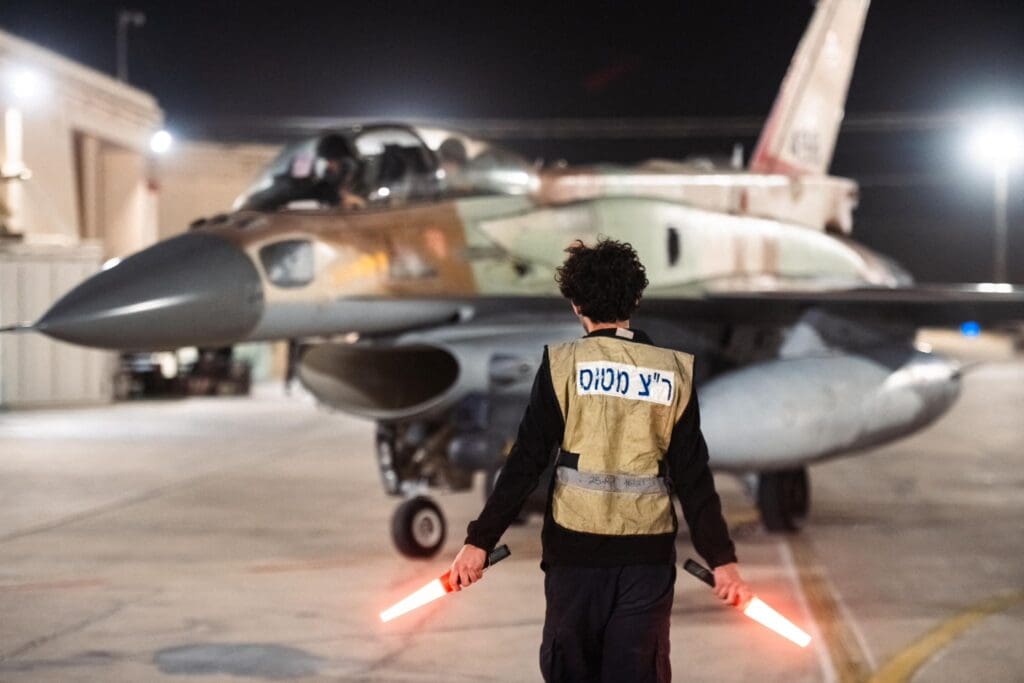On October 26, Israel carried out a long-anticipated strike against Iran, which came in retaliation for an Iranian missile barrage on Israel earlier this month—itself a response to a series of Israeli assassinations of Iranian, Hezbollah, and Hamas leaders since July. The latest exchange, however, marks a significant escalation in the confrontation between the two countries and raises the stakes on prospects for a full-scale regional war.
This time around, Israeli fighter jets are believed to have traversed Jordanian and Iraqi airspace to escape detection in attacking radar systems in Syria before launching long-range missiles at targets inside Iran. Unconfirmed reports suggest similar attacks targeted Iraqi air defenses, though the Iraqi sources have denied these claims.
Israel says 20 sites in Iran were hit—all described as military targets. This pattern mirrors Iran’s own approach in its October 1 attack, which also focused on Israeli military installations. An Israeli military spokesperson stated that the airstrikes specifically targeted Iranian missile production centers and ground-to-air defense systems, warning that Israel could select additional targets for future strikes if deemed necessary.
The Iranian Air Defense Command confirmed that “military sites in the provinces of Tehran, Khuzestan, and Ilam” were targeted. While acknowledging that some sites had been hit, Iranian statements aligned with Tehran’s usual practice of downplaying the success of enemy attacks; Iranian government spokesperson Fatemeh Mohajerani characterized the damage as “limited.” However, the Iranian army (Artesh) announced the deaths of four officers in the strikes.
While adhering to the official stance of downplaying the strategic impact, Iran’s acknowledgment of damage and casualties may be an intentional move to leave open the possibility of retaliation, using the casualties as a pretext. Concurrently, the Iranian Ministry of Foreign Affairs issued a statement asserting Iran’s right to self-defense, as enshrined in Article 51 of the United Nations Charter, declaring both its “right and duty” to respond to acts of external aggression.
Iranian Foreign Minister Abbas Araghchi echoed the government’s stance, stating, “Iran has no boundaries when it comes to defending its sovereignty, interests, and people.” However, Iranian media continue to downplay the Israeli attacks, suggesting that, at least for now, Iran may be reluctant to escalate the situation further with an overt response.
Despite this public position, some Iranian analysts warn that attacks on Tehran should not be “normalized.” Missile strikes on the capital are unprecedented since the Iran-Iraq War of the 1980s, signaling a significant development that they argue should not be treated lightly.
Analysts caution that Israel may be attempting to apply a “Lebanon model” in its approach to Iran—one characterized by limited, incremental actions that avoid full-scale war but gradually degrade capacity and create the opportunity for a larger offensive later on. Evidence supporting this theory includes Israel’s focus on Iranian radar, air defense and missile installations, which, if successfully targeted, could impair Iran’s ability to defend against further attacks or conduct retaliatory strikes.
Whether this recent exchange has concluded, or if Israel will continue military or intelligence operations in the coming days or weeks, remains uncertain. However, the ease with which Israel reportedly targeted Iran’s radar and air defense systems, even after weeks of apparent preparation and potential warnings to Iran, reveals vulnerabilities in Iran’s defenses. This could signal to Tehran that any further escalation might expose additional weaknesses.
It is worth noting that Iran’s military doctrine, known as “forward defense,” fundamentally relies on its ability to deliver a second strike, typically through missile forces or proxies. Aware of its air defense limitations, Iran factors its missile capabilities into its adversary’s calculations. The large-scale missile attack on Israel on October 1 reflects this strategy.
Further details on the extent of damage to Iran’s facilities, particularly missile production and storage sites, are essential for evaluating Tehran’s ability to maintain its second-strike capability and withstand potential Israeli attacks in the future. Initial satellite images suggest that Iran’s new solid-propellant rocket motor plant in Parchin, near Tehran, was among the sites targeted in the Israeli strikes. Substantial damage to this and similar facilities could significantly undermine Iran’s missile production capacity.
Meanwhile, the recent increase in U.S. military presence in the region, including the deployment of F-16 fighter jets, may be aimed at containing any potential Iranian response. The United States appears to have played a role in moderating Israel’s response, as earlier speculation indicated that Iranian oil and nuclear facilities could have been potential Israeli targets.
In any case, Iran is unlikely to launch a direct response to Israel before the U.S. elections. Afterward, Iran’s actions will likely hinge on Israeli conduct and the election outcome. Should Donald Trump be reelected, increasing the likelihood of a coordinated U.S.-Israeli strike on Iranian nuclear or infrastructure sites, a new escalation cycle may well follow.
For now, Iran is likely to rely on indirect actions through non-state partners and proxies—notably Hezbollah and possibly the Houthis. Coinciding with Israel’s airstrike, Hezbollah launched over 150 rockets into Israel. Developments on the Lebanese and Gaza fronts will also factor into Iran’s strategic decision-making. The United States just showed considerable influence over Israel’s strategic and military choices, and if Washington leverages this influence to encourage a ceasefire in Lebanon and Gaza, there may be a temporary easing of active hostilities.
In this context, the General Staff of the Iranian Armed Forces emphasized that “Iran advocates for a lasting ceasefire in Gaza and Lebanon while retaining its right [to respond] at the appropriate time.” This statement suggests that a cessation of hostilities in those regions could influence Iran’s final decision regarding its response strategy.
The crucial point is that the threshold for direct engagement between Iran and Israel has shifted since the onset of the Gaza war, breaking the longstanding taboo on overt, direct attacks. This shift suggests that the possibility of renewed, direct confrontation between Iran and Israel is now more likely, with the risk of escalation occurring more readily.
Finally, the response from Arab states has also been notable. Saudi Arabia was the first to condemn the Israeli attack on Iranian territory, with other Gulf Cooperation Council members, as well as Egypt and Jordan, following suit. These countries are clearly reluctant to be drawn into a broader regional conflict. In recent weeks, Iran’s foreign minister conducted an intensive regional diplomatic tour aimed at reassuring Iran’s Arab neighbors of Tehran’s intentions, while cautioning them not to align with Israel and the United States against Iranian interests. So far, these diplomatic efforts appear to have had a measure of success.


